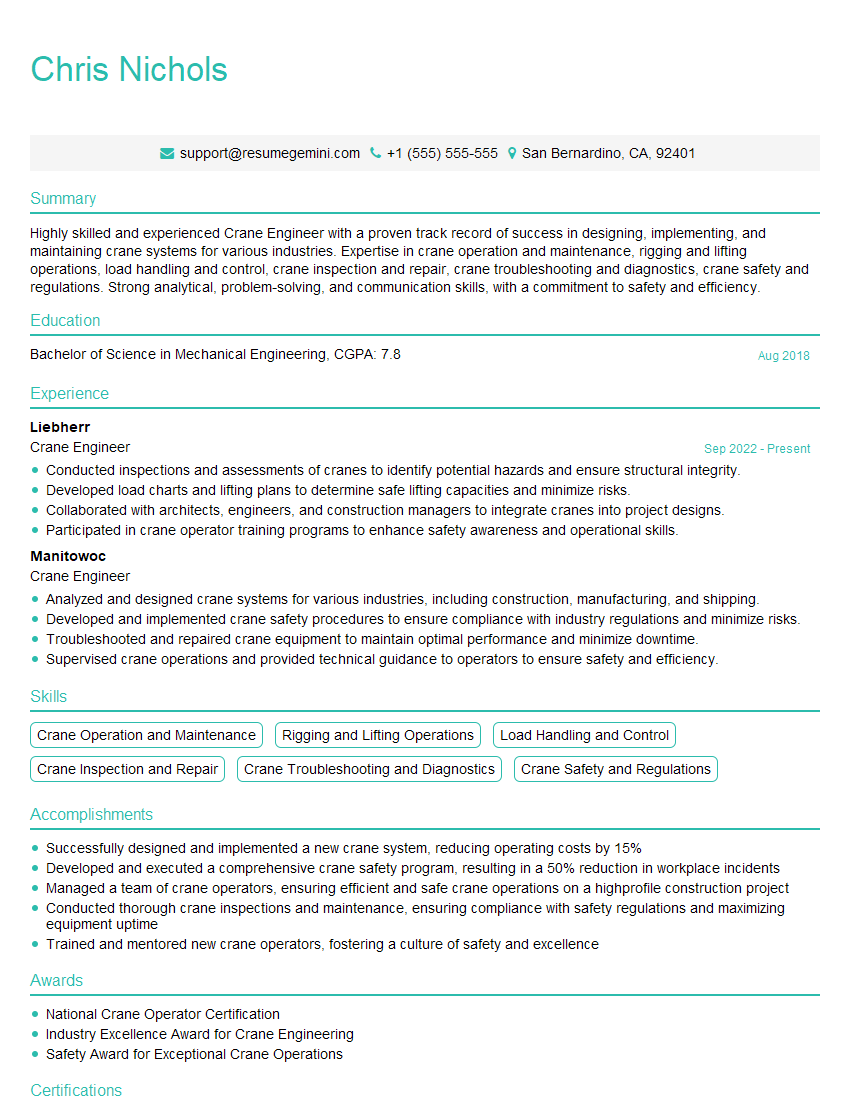Are you a seasoned Crane Engineer seeking a new career path? Discover our professionally built Crane Engineer Resume Template. This time-saving tool provides a solid foundation for your job search. Simply click “Edit Resume” to customize it with your unique experiences and achievements. Customize fonts and colors to match your personal style and increase your chances of landing your dream job. Explore more Resume Templates for additional options.

Chris Nichols
Crane Engineer
Summary
Highly skilled and experienced Crane Engineer with a proven track record of success in designing, implementing, and maintaining crane systems for various industries. Expertise in crane operation and maintenance, rigging and lifting operations, load handling and control, crane inspection and repair, crane troubleshooting and diagnostics, crane safety and regulations. Strong analytical, problem-solving, and communication skills, with a commitment to safety and efficiency.
Education
Bachelor of Science in Mechanical Engineering
August 2018
Skills
- Crane Operation and Maintenance
- Rigging and Lifting Operations
- Load Handling and Control
- Crane Inspection and Repair
- Crane Troubleshooting and Diagnostics
- Crane Safety and Regulations
Work Experience
Crane Engineer
- Conducted inspections and assessments of cranes to identify potential hazards and ensure structural integrity.
- Developed load charts and lifting plans to determine safe lifting capacities and minimize risks.
- Collaborated with architects, engineers, and construction managers to integrate cranes into project designs.
- Participated in crane operator training programs to enhance safety awareness and operational skills.
Crane Engineer
- Analyzed and designed crane systems for various industries, including construction, manufacturing, and shipping.
- Developed and implemented crane safety procedures to ensure compliance with industry regulations and minimize risks.
- Troubleshooted and repaired crane equipment to maintain optimal performance and minimize downtime.
- Supervised crane operations and provided technical guidance to operators to ensure safety and efficiency.
Accomplishments
- Successfully designed and implemented a new crane system, reducing operating costs by 15%
- Developed and executed a comprehensive crane safety program, resulting in a 50% reduction in workplace incidents
- Managed a team of crane operators, ensuring efficient and safe crane operations on a highprofile construction project
- Conducted thorough crane inspections and maintenance, ensuring compliance with safety regulations and maximizing equipment uptime
- Trained and mentored new crane operators, fostering a culture of safety and excellence
Awards
- National Crane Operator Certification
- Industry Excellence Award for Crane Engineering
- Safety Award for Exceptional Crane Operations
Certificates
- Certified Crane Operator (CCO)
- National Commission for the Certification of Crane Operators (NCCCO)
- OSHA Crane and Rigging Standards
- ANSI/ASME B30.5 Mobile and Locomotive Cranes
Career Expert Tips:
- Select the ideal resume template to showcase your professional experience effectively.
- Master the art of resume writing to highlight your unique qualifications and achievements.
- Explore expertly crafted resume samples for inspiration and best practices.
- Build your best resume for free this new year with ResumeGemini. Enjoy exclusive discounts on ATS optimized resume templates.
How To Write Resume For Crane Engineer
- Highlight your technical skills and experience in crane design, operation, and maintenance.
- Quantify your accomplishments whenever possible to demonstrate the impact of your work.
- Showcase your commitment to safety and regulatory compliance.
- Emphasize your ability to work effectively in a team environment and collaborate with other professionals.
Essential Experience Highlights for a Strong Crane Engineer Resume
- Analyzed and designed crane systems for various industries, including construction, manufacturing, and shipping.
- Developed and implemented crane safety procedures to ensure compliance with industry regulations and minimize risks.
- Troubleshooted and repaired crane equipment to maintain optimal performance and minimize downtime.
- Supervised crane operations and provided technical guidance to operators to ensure safety and efficiency.
- Conducted inspections and assessments of cranes to identify potential hazards and ensure structural integrity.
- Developed load charts and lifting plans to determine safe lifting capacities and minimize risks.
- Collaborated with architects, engineers, and construction managers to integrate cranes into project designs.
Frequently Asked Questions (FAQ’s) For Crane Engineer
What are the key skills required to be a successful Crane Engineer?
The key skills required to be a successful Crane Engineer include: crane operation and maintenance, rigging and lifting operations, load handling and control, crane inspection and repair, crane troubleshooting and diagnostics, crane safety and regulations, and project management.
What are the career prospects for Crane Engineers?
Crane Engineers are in high demand due to the growing construction and infrastructure industries. Career prospects include advancement to senior-level positions, such as Crane Manager or Director of Crane Operations.
What is the average salary for Crane Engineers?
The average salary for Crane Engineers varies depending on experience, location, and industry. According to Salary.com, the average salary for Crane Engineers in the United States is around $80,000 per year.
What is the work environment like for Crane Engineers?
Crane Engineers typically work in a variety of environments, including construction sites, factories, and warehouses. They may work independently or as part of a team. Crane Engineers must be able to work in all weather conditions and may be required to work overtime or on weekends.
What are the safety considerations for Crane Engineers?
Crane Engineers must be aware of the potential hazards associated with working with cranes. These hazards include: falling objects, electrical hazards, and mechanical failures. Crane Engineers must follow all safety procedures and wear appropriate safety gear.
What are the educational requirements for Crane Engineers?
Crane Engineers typically need a bachelor’s degree in mechanical engineering or a related field. Some Crane Engineers may also have a master’s degree. Crane Engineers must also be certified by a recognized organization, such as the National Commission for the Certification of Crane Operators (NCCCO).